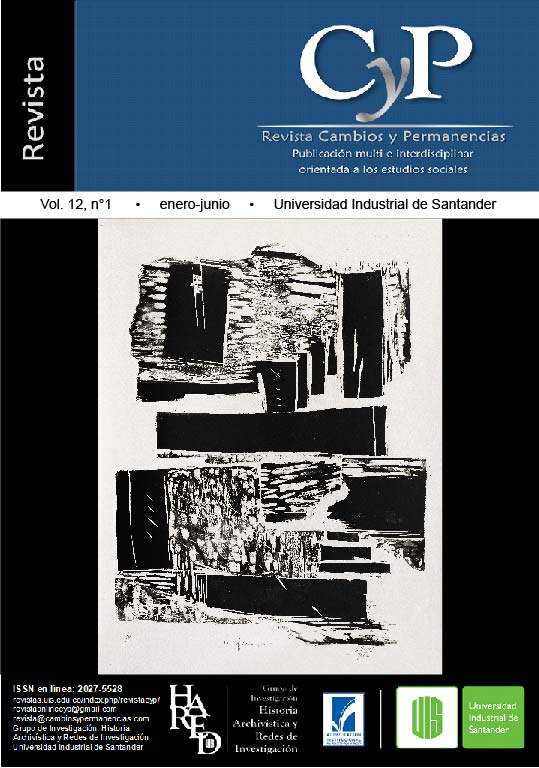Dictatorship - Openness, censorship and intergenerational narrative in Argentine Children's and Young People's Literature
Published 2021-06-28
Keywords
- Argentinian children’s literature,
- renewal,
- censorship,
- memory
How to Cite
Abstract
In this work, I will highlight three moments of Children's and Young People's Literature (LIJ) in relation to the last military dictatorship (1976-1983). Based on the contributions of the investigations of Mariano Medina, Judith Gociol and Hernán Invernizzi, Gabriela Pesclevi and my own contributions, a dialogic chain within the Argentine LIJ related to state terrorism can be observed. Therefore, the work is structured as follows.
First moment - Before the dictatorship (1969-1976): The construction of the emerging Argentine LIJ field with the contributions of Malicha Leguizamón and the seminars at the Universidad Nacional de Córdoba. This is the time of the rise of the stories that later the dictatorship will prohibit. The story "Un garbanzo peligroso" (“A Dangerous Chickpea”) and its respective song by Laura Devetach serve as a metaphor and a sample of that times.
Second moment - During the dictatorship (1976-1983): The LIJ field is observed by the censoring eye of repression. The systematic plan for the disappearance of people goes hand in hand with the project for the disappearance of symbols, images, products of culture and art - understood as the full exercise of freedom. The case of “La torre de cubos” ("The Cube Tower") by Laura Devetach is carefully analyzed given the conditions and the alleged arguments for its prohibition.
Third moment - After the dictatorship (1983-2021): In the democratic reconstruction, child-oriented voices about the events that occurred during the military dictatorship begin to be heard. Graciela Montes in the collection Entender y participar (Understand and Participate) and the book “El golpe” (“The Coup”) function as the kick-start of the intergenerational dialogue around the horror of the dictatorship. At the same time, there are stories such as “Cementerio clandestino” ("Clandestine Cemetery") by Eduardo Gonzales, novels such as “El mar y la serpiente” ("The Sea and the Serpent") by Paula Bombara and especially the book “Quién soy” ("Who am I?") written and illustrated by prominent artists from the Argentine LIJ.
In this review, I intend to show the historical evolution of the LIJ and its relationship with the works about memory as a space of struggle and as a revision of the past destined for childhood.
Downloads
References
AAVV. (2013). Quien soy, Relatos sobre identidad, nietos y reencuentros. Buenos Aires, Argentina: Calibroscopio.
Andruetto, M. T. (2016). La lectura. Otra revolución. Buenos Aires, Argentina: Fondo de Cultura Económica.
Bajour, C. (2010). La voz nace del silencio. Revista Imaginaria. Recuperado de http://www.imaginaria.com.ar/2010/07/la-voz-nace-del-silencio/
Bajour, C. (2016). La orfebrería del silencio. Córdoba, Argentina: Comunicarte.
Barthes, R. (2008). El placer del texto. Buenos Aires, Argentina: Siglo XXI.
Foucault, M. (2004). Discurso y verdad en la antigua Grecia. Buenos Aires, Argentina: Paidós.
Gociol, J., y Invernizzi, H. (2003). Un golpe a los libros. Buenos Aires, Argentina: EUDEBA.
González, E. A. (1998). Cementerio Clandestino. Buenos Aires, Argentina: Colección Libros del Malabarista / Gramón Colihue.
Jelin, E. (2002). Los trabajos de la memoria. Madrid, España: Siglo XXI.
Medina, M. (2011). Otro garbanzo peligroso, el libro perdido de Laura Devetach. Inédito.
Montes, G. (1986). Los derechos de todos. En Entender y Participar. Buenos Aires, Argentina: Libros del Quirquincho.
Montes, G. (1996). El golpe. Buenos Aires, Argentina: Editorial La Página S.A.
Pantana. (2014). Mañana viene mi tío. Buenos Aires, Argentina: Ediciones del eclipse.
Pesclevi, L. (2014). Libros que muerden. Buenos Aires, Argentina. Biblioteca Nacional.
Sarlo, B. (2005). Tiempo pasado. cultura de la memoria y giro subjetivo. una discusión. Buenos Aires, Argentina: Siglo Veintiuno Editores.
Scerbo, I. L. (2014). Leer al desaparecido en la literatura argentina para la infancia. Córdoba, Argentina: Comunicarte.
Todorov, T. (2000). Los Abusos de la memoria. Barcelona, España: Paidos.

